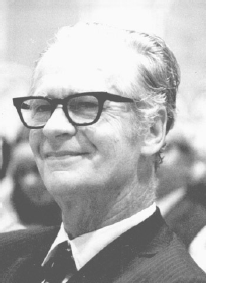B.F. Skinner (1904–90) was a leading American psychologist, Harvard professor and proponent of the behaviourist theory of learning in which learning is a process of ‘conditioning’ in an environment of stimulus, reward and punishment. Skinner explains the difference between informal learning, which occurs naturally, and formal education, which depends on the teacher creating optimal patterns of stimulus and response (reward and publishment), or ‘operant conditioning’:

The application of operant conditioning to education is simple and direct. Teaching is the arrangement of contingencies of reinforcement under which students learn. They learn without teaching in their natural environments, but teachers arrange special contingencies which expedite learning, hastening the appearance of behavior which would otherwise be acquired slowly or making sure of the appearance of behavior which might otherwise never occur …
In improving teaching it is less important to find new reinforcers than to design better contingencies using those already available. Immediate and consistent reinforcement is, of course, desirable but this is not to deny the importance of intermittent or remote reinforcers. The student who knows how to study knows how to amplify immediate consequences so that they prove reinforcing. He not only knows, he knows that he knows and is reinforced accordingly. The transition from external reinforcement to the self-generated reinforcement of knowing what one knows is often badly handled. In a small class the precurrent behavior of listening, reading, solving problems, and composing sentences is reinforced frequently and almost immediately, but in a large lecture course the consequences are infrequent and deferred. If mediating devices have not been set up, if the student is not automatically reinforced for knowing that he knows, he then stops working, and the aversive by-product of not-knowing pile up.
Frequent reinforcement raises another problem if it reduces the teacher’s reinforcing power. Money, food, grades, and honors must be husbanded carefully, but the automatic reinforcements of being right and moving forward are inexhaustible …
Strictly speaking, the student cannot reinforce or punish himself by withholding positive or negative reinforcers until he has behaved in a given way, but he can seek out or arrange conditions under which his behavior is reinforced or punished … He can create reinforcing events, as by checking an answer to a problem. He can stop emitting unreinforced responses in an unfavorable situation … for example, he can learn not to read books which are too hard for him so that his inclination to read other books will not suffer … Education has never taught the self-management of motivation very effectively. It has seldom tried. But techniques become available as soon as the problem is understood …
Through a proper understanding of contingencies of reinforcement, we should be able to make students eager and diligent and be reasonably sure that they will continue to enjoy the things we teach them for the rest of their lives.
Skinner, B.F. 1968. The Technology of Teaching. New York: Meredith Corporation. pp. 61–2, 64–5, 155–8, 167–8. || WorldCat
